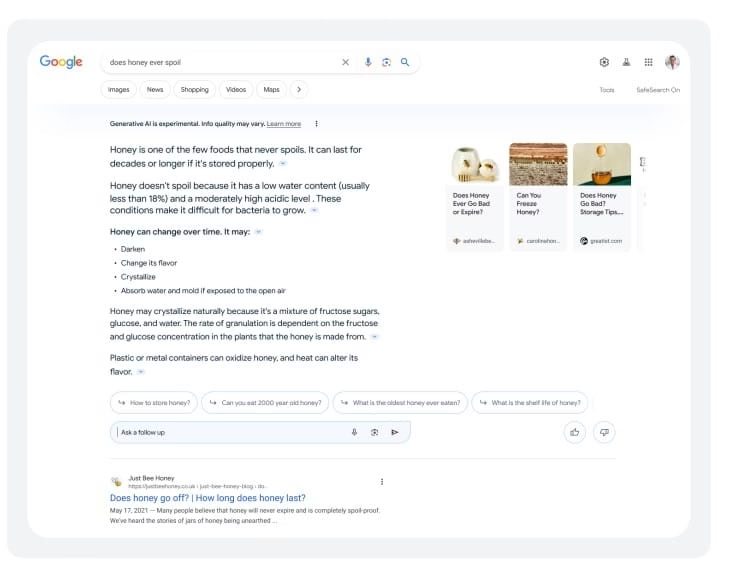
Generative AI (GAI) is a type of artificial intelligence (AI) that can create new data or content from scratch. This is in contrast to traditional AI, which can only learn from and make predictions based on existing data. GAI has the potential to revolutionize many industries, including search.
How Generative AI Works
GAI works by using a neural network to learn the underlying patterns in data. Once the neural network has learned these patterns, it can then generate new data or content that is similar to the data it was trained on.
Benefits of Generative AI in Search
GAI has a number of potential benefits for search. These benefits include:
- Improved search results: GAI can be used to generate more relevant and informative search results. This is because GAI can learn from the user’s query and generate results that are tailored to their specific needs.
- New ways to search: GAI can be used to create new ways to search. For example, GAI can be used to generate images or videos that illustrate the user’s query.
- Personalized search experience: GAI can be used to personalize the search experience for each user. This is because GAI can learn from the user’s past searches and generate results that are tailored to their interests.
With generative AI in Search, people are able to:
- Ask new kinds of questions that are more complex and
more descriptive - Get the gist of a topic faster, with links to relevant results
to explore further - Get started on something you need to do quickly, like
writing drafts or generating imagery right from where
you’re searching - Make progress easily, by asking conversational follow-ups
or trying suggested next steps

Use Cases for Generative AI in Search
Despite the challenges, GAI has a number of potential use cases in search. These use cases include:
- Generating search results: GAI can be used to generate search results that are more relevant and informative.
- Creating new ways to search: GAI can be used to create new ways to search, such as generating images or videos that illustrate the user’s query.
- Personalizing the search experience: GAI can be used to personalize the search experience for each user, such as generating results that are tailored to
How to optimize your content for Generative AI in Search
Optimizing content for Generative AI in Search (GAIS) involves understanding how AI algorithms generate and interpret content to deliver search results. While this area is still evolving, here are some strategies to optimize content for Generative AI in Search:
Understand AI-Driven Search: Familiarize yourself with how Generative AI algorithms work and how they interpret and generate content. This includes understanding natural language processing (NLP), machine learning, and how AI systems analyze and rank content.
Semantic SEO: Focus on semantic SEO, which involves creating content that is semantically relevant and contextually rich. Instead of keyword stuffing, focus on creating comprehensive content that covers a topic in-depth and addresses various related concepts and questions.
Structured Data Markup: Implement structured data markup on your website to provide additional context to search engines about your content. This can help AI algorithms better understand the purpose and meaning of your content, potentially leading to improved rankings.
Content Quality and Relevance: Prioritize creating high-quality, relevant content that provides value to users. Generative AI algorithms aim to deliver the most relevant and useful content to searchers, so focus on meeting user intent and addressing their needs.
Natural Language Processing (NLP): Optimize your content for natural language processing by using clear and concise language that is easy for AI algorithms to interpret. Avoid overly complex language or jargon that may confuse AI systems.
User Engagement Signals: Pay attention to user engagement signals such as click-through rates, dwell time, and bounce rates. Generative AI algorithms may use these signals to determine the quality and relevance of your content, so aim to create content that encourages user interaction and engagement.
Optimize for Featured Snippets and SERP Features: Structure your content in a way that is optimized for featured snippets and other SERP features. This may involve providing concise answers to common questions, using bullet points or numbered lists, and formatting your content for easy scanning.
Monitor and Adapt: Keep track of changes in AI-driven search algorithms and adjust your content strategy accordingly. Stay informed about updates to AI models and search engine algorithms to ensure that your content remains optimized for Generative AI in Search.
Accessibility and Readability: Ensure that your content is accessible and readable for all users, including those with disabilities. This includes using descriptive alt text for images, providing transcripts for videos, and using headings and formatting to improve readability.
Ethical Considerations: Be mindful of ethical considerations when optimizing content for AI-driven search. Avoid tactics that may manipulate or deceive AI algorithms, and focus on creating content that provides genuine value to users.
TIP: Adding a FAQ section with schema markup can be helpful for Generative AI in Search. Here’s why:
Enhanced Search Results: When you add FAQ schema markup to your website’s FAQ section, it provides additional structured data to search engines. This structured data helps search engines understand the content of your FAQ section better, potentially leading to enhanced search results.
Featured Snippets: FAQ schema markup can increase the likelihood of your FAQ content being featured in Google’s rich snippets or answer boxes. Generative AI algorithms may prioritize content that is structured with schema markup and displayed prominently in search results.
Improved User Experience: Clear and concise FAQ sections can improve the user experience by providing quick answers to common questions. This can lead to increased user engagement and satisfaction, which may positively impact your site’s performance in search results.
Semantic Understanding: FAQ schema markup helps Generative AI algorithms better understand the semantic context of your content. By providing structured data about the questions and answers in your FAQ section, you’re making it easier for AI systems to interpret and process your content.
Voice Search Optimization: With the rise of voice search, FAQ schema markup can make your content more accessible to voice assistants like Siri, Alexa, and Google Assistant. When users ask questions related to your FAQ topics, having structured data in place increases the chances of your content being surfaced as a relevant answer.
Overall, adding FAQ schema markup to your website’s FAQ section can improve its visibility, relevance, and accessibility in Generative AI-driven search results. It’s a valuable optimization technique that can benefit both your site’s SEO and user experience.
By following these strategies, you can optimize your content for Generative AI in Search and improve its visibility and relevance in AI-driven search results.
Useful links : https://searchengineland.com/why-links-are-not-dead-437017

